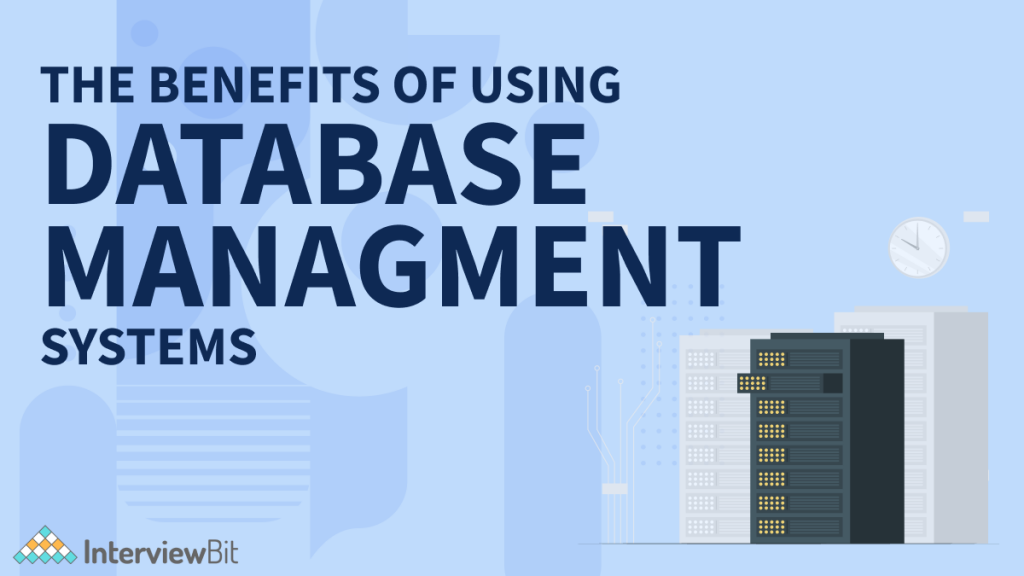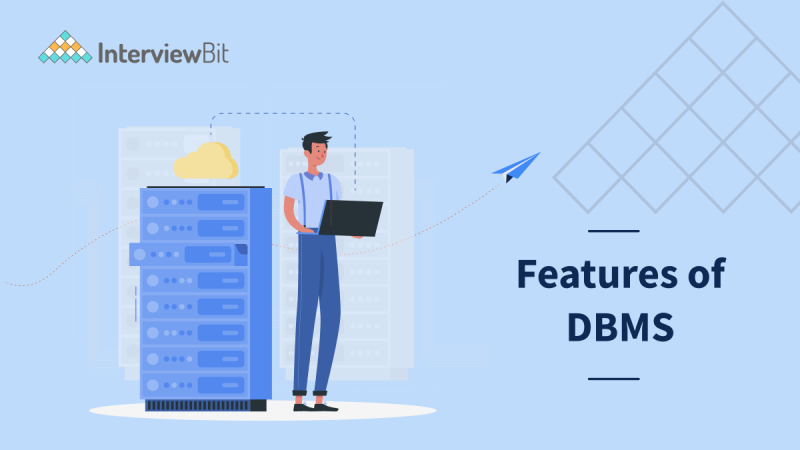The importance of data in today’s world is known to all. Tonnes of data is being generated each and every day and a lot of analysis is done on that data so that companies and startups can make business decisions based on them. Have you ever thought about how the humongous amount of data being generated every day is being managed by people? The answer to this question is a “Database“.
- Introduction To DBMS
- Benefits Of Database Management Systems (DBMS)
- Features Of DataBase Management Systems (DBMS):
- 1. Minimum Redundancy and Duplication
- 2. Reduced amount of space and money spent on storage
- 3. Data Organization
- 4. Customization of the Database
- 5. Data Retrieval
- 6. Usage Of Query Languages
- 7. Multi User Access
- 8. Data Integrity is Maintained
- 9. Management of Metadata
- 10. Maintenance of a Large Database
- 11. Data Durability
- 12. Provides a High Level of Data Security
- 13. Enhanced File Uniformity
- Conclusion
- Frequently Asked Questions (FAQs)
- Additional Resources
Introduction To DBMS
In computer science, a database can be defined as an organized collection of data that can be stored and accessed electronically from a computer system. With the increase in the size of the data, databases become more and more complex and they are often developed using formal design and modeling techniques.
Database Management Systems (DBMS) are nothing but software which is used to interact with the end-users, applications, and the database itself for capturing, managing, and analyzing data. They are software that provides a lot of functionalities to administer the database, for instance, writing data into the database, reading or querying data from the database, and many more. Database Management Systems not only handle the data but also the database schema and the database engine for simplifying the organization and manipulation of data.
Confused about your next job?
Database Management System applications like MySql, Oracle, etc. are immensely used in businesses to model and manage business objects within corporate databases. They provide lots of advantages to enable organizations to keep their business records secured, consistent and relevant. Database Management Systems are also being used by a number of schools, Governments, and many other organizations because of the variety of features that they have to offer.
In order to do Data Analytics and Data Mining, that is, to get insights from already present data to make business decisions, a proper way of storing data is extremely crucial. Also, it is very crucial that the Database Management Systems are extremely good in performance and the queries to retrieve, update, delete and add data are done really fast. This is where the choice of a good DBMS software comes into play. In order to make this decision, we need to know all the benefits and features which the Database Management Systems have to offer us. We are going to take a look at just that in the following sections of this article. As we can see in the picture given below, a Database Management System acts as an intermediary between the database and the users or applications which want to interact with the database and makes this interaction seamless between the two end parties.

Benefits Of Database Management Systems (DBMS)
The concept of using database management systems in business was first proposed years ago, and it is still quite popular among businesses today. Despite the fact that Database Management systems require a significant investment in server infrastructure, maintenance, and security, an increasing number of businesses are deploying databases to handle corporate documents and records. The reason for that is that Database Management Systems have a lot of benefits to offer to the users. Let us take a look at some of the benefits which DataBase Management Systems have to offer to us:
- Data Integrity: Data Integrity is maintained in a Database Management System. This means that the structure of the database can change, but the application that uses the data does not have to change.
- Data Consistency: Data Consistency is also maintained in a Database Management System. The data is identical regardless of who is inspecting it.
- Data Backups: Backing up data from a single location is simple.
- Data Security: In DBMSs, Data is housed in a secure central location, and many access privileges can be assigned to multiple people.
- Customization of Applications: Applications can be tailored to meet the specific needs of the user without having to change the database.
- Data Accessibility: One of the main benefits of a Database Management System is that the same business data can be made available to various personnel at any time and from any location. A database management system (DBMS) allows multiple users to access information that is accessible remotely and twenty-four hours a day, seven days a week.
- Data Redundancy or Data Duplication is Minimized: In a database management system, information is kept concise and only appears once to avoid data unpredictability. This is done using a technique called Normalization (Database normalization is the process of structuring a database, usually a relational database, in accordance with a series of so called normal forms in order to reduce data redundancy and improve data integrity). Data redundancy is reduced as a result of this capability. For businesses, this implies that they won’t have to repeat the same information over and over. Companies can now drastically cut the cost of storing company data on storage devices.
- Data Management Made Simple: Another benefit of database management software is that it facilitates data management by providing users with easy yet powerful tools for entering, changing, and exporting corporate data. Through data customization, Database Management System also decreases individual users’ reliance on computer specialists and programmers to satisfy their specific demands.
- No Dependency on Any Programming Language: Yet another benefit of Database Management Systems is that it is independent of any type of programming language. This means that one does not have to know any specific programming language in order to access a Database Management System. Writing SQL or NoSQL queries would be sufficient irrespective of what programming language is being used in the application.
- Data Durability: Database Management Systems also ensures data durability, that is, even if there is a power outage or any other disaster for that matter, the data in the Database will persist.

Features Of DataBase Management Systems (DBMS):
Now that we know what Database Management Systems are and what are the benefits of using them, let us dive deep into them and understand what are the different features which Database Management Systems have to offer to us:
1. Minimum Redundancy and Duplication
Because databases are used by so many people, the risks of data duplication are relatively high. But in a database management system, data files are shared which brings down data duplication and redundancy. Due to the fact that all information in a database management system occurs only once, the odds of duplication are quite low. In other words, the same data file is accessible to all the people using the database, and the changes made by any one of the users get reflected for the data file of all the users and therefore, redundancy and duplication are avoided.
2. Reduced amount of space and money spent on storage
All database management systems must save a large amount of data. However, proper data integration saves a lot of space in the database management system. Companies spend a lot of money to keep their data safe. They will save money on data storage and data entry if they have managed data to store.
3. Data Organization
In a Database Management system, a digital repository’s information is structured in a clear hierarchical structure using records, tables, and objects. Every piece of information which we enter into our database will be structured in a catalog, making it easy to search and edit our records later.
4. Customization of the Database
Along with the default and required components (records, tables, or objects) that make up a database’s structure, custom elements can be constructed to fit the demands of unique users. For example, Binary Large Objects or BLOBS can be used to store images in databases and mappings can be maintained between various tables to implement complex entities.
5. Data Retrieval
The database management system, or DBMS, accepts and stores data from users. Users can subsequently get their records from the database and save them as a file, print them, or display them on the screen. Data Retrieval becomes a big advantage of the database management systems as only authenticated users can fetch data from the database and unauthenticated users are denied access, thus improving the security of the data.
6. Usage Of Query Languages
A typical Database Management System allows users to utilize query languages for collecting, searching, sorting, altering, and other tasks that enable them to manipulate their database entries. An example of a famous query language is SQL (Structured Query Language). Anyone, even without the knowledge of any programming language, can access a Database Management System easily without hassle.
7. Multi User Access
Multiple users can access all forms of information contained in the same data store with a Multi-User Access Database Management System. A security feature additionally restricts some users from seeing and/or altering specific data types and only authenticated users can access the database.
8. Data Integrity is Maintained
Multiple users can access all information in a database, but only one user can edit the same piece of data at a time. This feature allows you to avoid database corruption and failure and ensures that the Integrity of Data is maintained.
9. Management of Metadata
Metadata is “data that provides information about other data”, but not the content of the data, such as the text of a message or the image itself. The metadata library (or data dictionary) in DBMS database management software explains how the database is organized and what parts (objects, associated files, records, and so on) make up its structure.
10. Maintenance of a Large Database
Only a database management system can keep large databases of large corporations up to date. These databases necessitate a high level of security as well as backup and recovery capabilities. Database Management System includes all of these functionalities. It has the ability to keep a database with a large amount of data and information.
11. Data Durability
All data files are permanently stored by Database Management System, so there is no risk of data loss. If the data is lost, the organization’s data files can be saved using a backup and recovery procedure. As a result, there is no need to be concerned about data loss in Database Management Systems.
12. Provides a High Level of Data Security
All companies that handle a substantial volume of data are concerned about security. Except for the Database Administrator or the department head, Database Management Systems does not grant complete database access. They have the ability to change the database and create all of the users, therefore the database management system’s security level is increased.
13. Enhanced File Uniformity
Any business can build a homogeneous way to implement files and validate data uniformity with any other application programmes or systems by using the Database Management Systems. It is critical to rationalize and govern modern data management systems. A progressive database system’s application software enables the application of the same rules to all data across the organization.

Conclusion
So, in conclusion, we have learned through this article that a database management system (DBMS) is a collection of programs that alter, store, and retrieve user data records from databases while adhering to security protocols. As a result, it provides a link between information repositories and application software. During this phase, the DBMS accepts an application program’s request for data information and instructs the operating system to provide the requested information. Any budding development or data analytics enthusiast of today should definitely have a thorough knowledge of what Database Management Systems are and what features and benefits they have to offer.
A lot of software companies and startups ask a variety of questions on Database Management Systems in their interviews and therefore, for people applying for software or data analytics-related job profiles, knowing about Database Management Systems is a must. We hope we have been able to deliver knowledge about the same to our readers through this article.
Frequently Asked Questions (FAQs)
Q: What are the key features of DBMS?
Answer: The key features of DBMS have been discussed extensively in the “Features Of Database Management Systems (DBMS)” of this article.
Q. What are the functions of DBMS?
Answer: Some of the most common functions of DBMS are as follows:
- Data Dictionary Management,
- Security Management,
- Data Storage Management,
- Data Transformation and Presentation,
- Database Access Languages and Application Programming Interfaces,
- Multi user Access Control,
- Backup and Recovery Management,
- Data Integrity Management and
- Database Communication interfaces.
Q. What are the major capabilities of DBMS?
Answer: DBMS usually deals with CRUD – Create Read Update and Delete – operations on Databases. The major capabilities of DBMS are as follows:
- Data Storage.
- Data Retrieval.
- Data Deletion
- Data Updation.
- Data Security.
- Data Independence.




